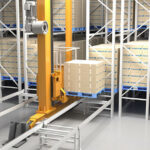1.What are AGVs and AMRs, and how do they differ?
AGVs (Automated Guided Vehicles) and AMRs (Autonomous Mobile Robots) are both automated transport solutions, but they differ in their level of autonomy. AGVs follow predefined paths guided by lasers, QR codes, or magnetic tape, while AMRs can navigate dynamically using sensors and artificial intelligence to avoid obstacles and plan their own routes.
2.What are the benefits of using AGVs and AMRs in warehouse operations?
AGVs and AMRs offer several benefits, including:
Increased efficiency:
They can automate repetitive tasks like transporting goods, freeing up human workers for more complex tasks.
Improved accuracy:
Automated navigation reduces the risk of errors compared to manual transport.
Enhanced safety:
Eliminating human forklift operation reduces the risk of accidents and injuries.
Reduced costs:
Automation can lead to lower labour costs and improved operational efficiency.
Data insights:
AMRs can collect valuable data on warehouse operations, enabling better decision-making.
What are some typical applications for AGVs and AMRs in warehouses?
AGVs and AMRs are used for various applications, including:
Pallet transport:
Moving pallets of goods between different areas of the warehouse.
Order picking:
Assisting workers with picking and sorting orders.
Replenishment:
Automatically restocking shelves and storage bins.
Kitting and assembly:
Transporting parts and materials for assembly processes.
Waste removal:
Removing waste materials from production and storage areas.
What are the key factors to consider when choosing an AGV or AMR solution?
The size and layout of your warehouse:
Different AGVs and AMRs are suitable for different types of spaces.
The types of goods you handle:
Some AGVs are better suited for specific types of loads.
Your budget:
AGVs and AMRs come in a range of prices, depending on their capabilities.
Your level of automation:
Consider whether you need a fully autonomous solution or a system that works alongside human workers.
How can AGVs and AMRs be integrated into existing warehouse operations?
Integrating AGVs and AMRs can be done smoothly with careful planning and implementation. This may involve:
Upgrading your warehouse infrastructure:
Ensuring your floors are smooth and free of obstacles.
Installing guidance systems:
Setting up lasers, QR codes, or magnetic tape for AGVs to follow.
Developing software integration:
Connecting your warehouse management system with the AGV/AMR control system.
Training your staff:
Providing your workers with training on how to safely interact with the AGVs and AMRs.
What are the safety considerations when using AGVs and AMRs in warehouses?
Safety is paramount when using any automated equipment. Some important considerations include:
Emergency stop systems:
Ensuring all AGVs and AMRs have reliable emergency stop mechanisms.
Obstacle detection:
Choosing AGVs and AMRs equipped with sensors to detect and avoid obstacles.
Traffic management:
Implementing clear rules and procedures for both human and automated traffic in the warehouse.
Regular maintenance:
Ensuring all AGVs and AMRs are properly maintained to prevent malfunctions.
Join forces with SmartlogitecX, backed by the technological strength of WayZim Technologies, and lead the charge in Warehouse Automation in Australia and New Zealand. We are more than a service; we are your strategic partner in redefining logistics. Opt for SmartlogitecX to harness the full potential of advanced technology, crafted with an understanding of the local market. Connect with our sales team to begin your journey towards an automated, efficient future.



